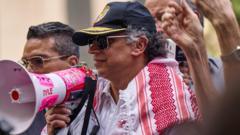Why Did the US Revoke the Colombian President's Visa at the UN?

Published: 2025-09-27 06:55:13 | Category: world
The US State Department has announced the revocation of Colombia's President Gustavo Petro's visa due to what it described as "incendiary actions" during a pro-Palestinian protest in New York. This decision follows Petro's controversial remarks urging US soldiers to disobey orders, which the State Department deemed reckless.
Last updated: 06 October 2023 (BST)
Key Takeaways
- The US State Department revoked President Gustavo Petro's visa over his actions at a protest in New York.
- Petro urged US soldiers to disobey orders during a speech, which the State Department condemned.
- His remarks were made in the context of US military actions against drug trafficking in the Caribbean.
- Colombia's Interior Minister defended Petro, suggesting Israeli PM Netanyahu should face similar consequences.
- The incident highlights the deteriorating relations between Colombia and the US under Petro's leadership.
Background on Gustavo Petro
Gustavo Petro, who took office in August 2022, is Colombia's first left-wing president. His administration has focused on social reforms and addressing issues like drug trafficking and inequality. However, his leadership has also seen a strain in relations with the United States, a key ally and historical partner in Colombia's fight against drug cartels.
Details of the Incident in New York
On Friday, Petro participated in a pro-Palestinian protest in New York, where he made remarks that have since sparked controversy. During his speech, he called for an international army to be formed, exceeding the size of the United States military. His call to action was aimed at urging US soldiers to disobey orders, which he framed as a challenge to "tyranny," particularly in reference to military actions taken by the previous Trump administration.
US State Department's Response
The State Department's decision to revoke Petro's visa was immediate, citing his "reckless and incendiary actions" as justification. The department's statement on social media condemned Petro's speech, stating that it incited violence and undermined US military authority. The revocation is particularly significant as it reflects the US's disapproval of foreign leaders interfering in military matters, especially in a global context where US military involvement is often scrutinised.
Colombian Government's Reaction
In response to the visa revocation, Colombia's Interior Minister Armando Benedetti took to social media to express his support for Petro. He suggested that Israeli Prime Minister Benjamin Netanyahu deserved similar treatment for his actions and that Petro's remarks were a courageous stance against perceived injustices. Benedetti's comments underscore the division in perspectives regarding international relations and the treatment of leaders from different political backgrounds.
Context of US Military Actions
Petro's comments were made in the context of US military operations targeting drug trafficking in the Caribbean, which have involved airstrikes on vessels suspected of transporting narcotics. The US has accused Venezuela's government of harbouring drug cartels, complicating the geopolitical landscape in the region. Petro, as Colombia's leader, has voiced concern about the impact of such operations on his country's citizens, suggesting that innocent lives may have been lost in the process.
Implications for Colombia-US Relations
The revocation of Petro's visa is likely to exacerbate the already tense relationship between Colombia and the United States. Under Petro's leadership, Colombia has adopted a more critical stance towards US policies, especially regarding military interventions and drug enforcement strategies. This shift represents a departure from previous administrations that maintained a more collaborative approach with the US.
Conclusion: What Happens Next?
The revocation of President Petro's visa raises questions about the future of Colombia's foreign relations, especially with the United States. Will this incident lead to further diplomatic rifts, or can both nations find common ground despite their differences? As Colombia navigates its path under a leftist government, the international community will be watching closely to see how relations evolve.
FAQs
Why was President Petro's visa revoked?
The US State Department revoked President Gustavo Petro's visa due to his incendiary remarks during a pro-Palestinian protest, where he urged US soldiers to disobey orders.
What were Petro's comments about US military actions?
Petro likened US airstrikes on drug trafficking boats to an act of tyranny and called for the formation of an international army larger than the US military.
How has the Colombian government reacted to the visa revocation?
Colombian Interior Minister Armando Benedetti defended Petro, suggesting that Israeli Prime Minister Netanyahu should face similar consequences for his actions.
What are the implications for Colombia's relationship with the US?
The visa revocation is likely to worsen relations between Colombia and the US, as it highlights ongoing tensions under Petro's leftist administration.
What is the historical context of US-Colombian relations?
The US and Colombia have a long history of cooperation, particularly in combating drug trafficking. However, recent shifts in Colombian leadership have introduced new challenges.
What can we expect from Colombia's future foreign policy?
Under President Petro, Colombia's foreign policy may continue to prioritise human rights and social justice over strict alignment with US military strategies.



